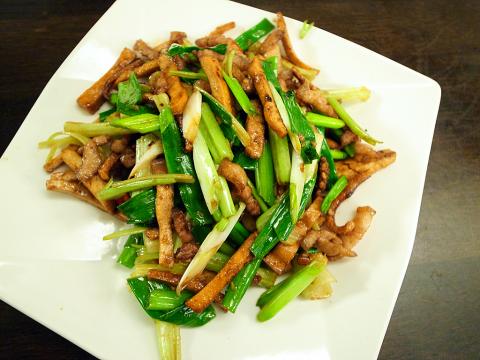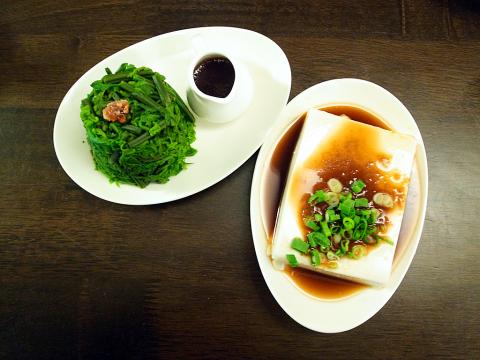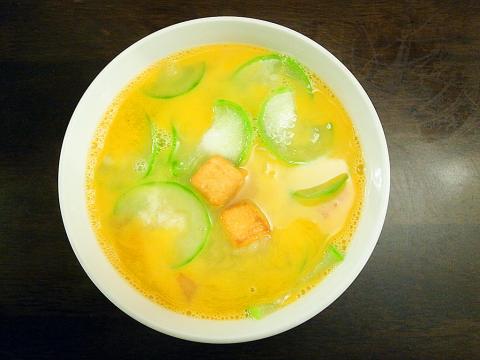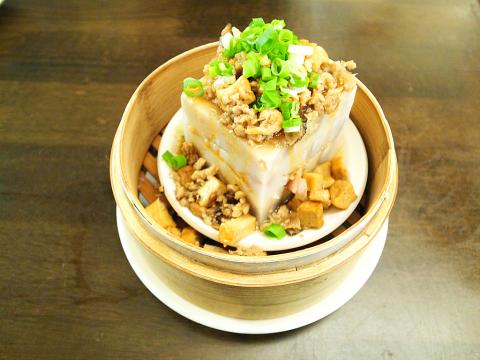Situated down an alley off the busy Heping East Road (和平東路) or Dunhua South Road (敦化南路), depending on where you come from, there is an unassuming restaurant serving authentic Hakka dishes to nearby office workers and local residents. As comfort food, the fare at Liouduei Kitchen conjures up an image of home, where a resourceful mother transforms simple ingredients into rich, flavorful meals on a next-to-nothing budget.
Take Hakka stir-fry (客家小炒, NT$163), a dish indispensable to Hakka cuisine, for example. It is easily cooked, using common ingredients such as bean curd, fatty pork, dried squid and shrimp, red pepper, scallions and celery. But when all these ingredients are put together, they create a rustic zest best paired with a bowl of steaming rice.
Liouduei’s version of this Hakka home-style dish surely hits the spot, properly seasoned, not too salty or oily.

Photo: Ho Yi, Taipei Times
Before diving into the restaurant’s single-page menu, however, diners might want to check out the cabinet next to the counter, which contains a selection of appetizers (NT$40 or NT$60 for each plate). Among them, the guomao (過貓), or vegetable fern, salad with kumquat dressing (桔香涼拌過貓, NT$60) is an interesting combination of the sweet citrus sauce and the mountain vegetable’s slightly sharp taste.
A snack said to originate from Meinong (美濃) in Greater Kaohsiung, the peanut tofu (花生豆腐, NT$67) with garlic and soy sauce comes as a nice surprise. Made from rice and peanuts instead of soybean, the seemingly plain block of soft tofu has the silken texture of tofu pudding (豆花), creamy with a mousse-like consistency. What’s more, the simple starter has many layers of flavor and manages to create a harmony between the garlic’s piquancy and the slightly sweet, nutty flavor of the tofu.
For main dishes, the salty egg and sponge gourd noodles (鹹蛋絲瓜麵線, NT$98) is a revelation. Immersed in a savory broth that is given an alluring golden glow by salty egg yolk, the thin slices of gourd are cooked tender on the inside and remain adequately crisp on the outside. The egg’s sharp taste nicely complements the gourd’s mellowness, punctuated by small chunks of tofu fried with salty yolk.

Photo: Ho Yi, Taipei Times
Less impressive though still adequate is the Hakka steamed taro cake (客式芋頭蒸糕, NT$67) with pork, bean curd, dried shrimps and scallions sprinkled on top.
Other popular dishes include Hakka-style tofu with salty egg (客家金沙豆腐, NT$163), rice noodle soup with taro (芋頭米粉湯, NT$98) and rice bowl with pickled vegetable and salty pork (福菜鹹豬肉拌飯, NT$98). A couple of items I haven’t tried but definitely want to are the Hakka savory glutinous rice balls (客家鹹湯圓, NT$82) and leicha (擂茶) pancake with mochi, or glutinous rice (擂茶麻糬鍋餅, NT$67). Leicha, or pounded tea, is a quasi-essential Hakka drink that mixes grounded and powdered tea leaves, peanuts, sesame seeds, herbs and other ingredients.
Simply decorated, clean and brightly lit, the dining environment is homey. Every time I visit, the service is always good. The Hakka establishment is evidently a popular dining option in the neighborhood as it is often full during rush hours.

Photo: Ho Yi, Taipei Times
For those who work or live outside the area, Liouduei Kitchen recently opened a new branch at B1, 2, Zhongshan N Rd Sec 2, Taipei City (台北市中山北路二段2號B1). Telephone: (02) 2563-6239.

Photo: Ho Yi, Taipei Times

On April 26, The Lancet published a letter from two doctors at Taichung-based China Medical University Hospital (CMUH) warning that “Taiwan’s Health Care System is on the Brink of Collapse.” The authors said that “Years of policy inaction and mismanagement of resources have led to the National Health Insurance system operating under unsustainable conditions.” The pushback was immediate. Errors in the paper were quickly identified and publicized, to discredit the authors (the hospital apologized). CNA reported that CMUH said the letter described Taiwan in 2021 as having 62 nurses per 10,000 people, when the correct number was 78 nurses per 10,000

As we live longer, our risk of cognitive impairment is increasing. How can we delay the onset of symptoms? Do we have to give up every indulgence or can small changes make a difference? We asked neurologists for tips on how to keep our brains healthy for life. TAKE CARE OF YOUR HEALTH “All of the sensible things that apply to bodily health apply to brain health,” says Suzanne O’Sullivan, a consultant in neurology at the National Hospital for Neurology and Neurosurgery in London, and the author of The Age of Diagnosis. “When you’re 20, you can get away with absolute

May 5 to May 11 What started out as friction between Taiwanese students at Taichung First High School and a Japanese head cook escalated dramatically over the first two weeks of May 1927. It began on April 30 when the cook’s wife knew that lotus starch used in that night’s dinner had rat feces in it, but failed to inform staff until the meal was already prepared. The students believed that her silence was intentional, and filed a complaint. The school’s Japanese administrators sided with the cook’s family, dismissing the students as troublemakers and clamping down on their freedoms — with

As Donald Trump’s executive order in March led to the shuttering of Voice of America (VOA) — the global broadcaster whose roots date back to the fight against Nazi propaganda — he quickly attracted support from figures not used to aligning themselves with any US administration. Trump had ordered the US Agency for Global Media, the federal agency that funds VOA and other groups promoting independent journalism overseas, to be “eliminated to the maximum extent consistent with applicable law.” The decision suddenly halted programming in 49 languages to more than 425 million people. In Moscow, Margarita Simonyan, the hardline editor-in-chief of the